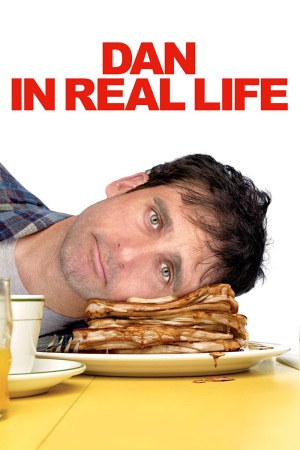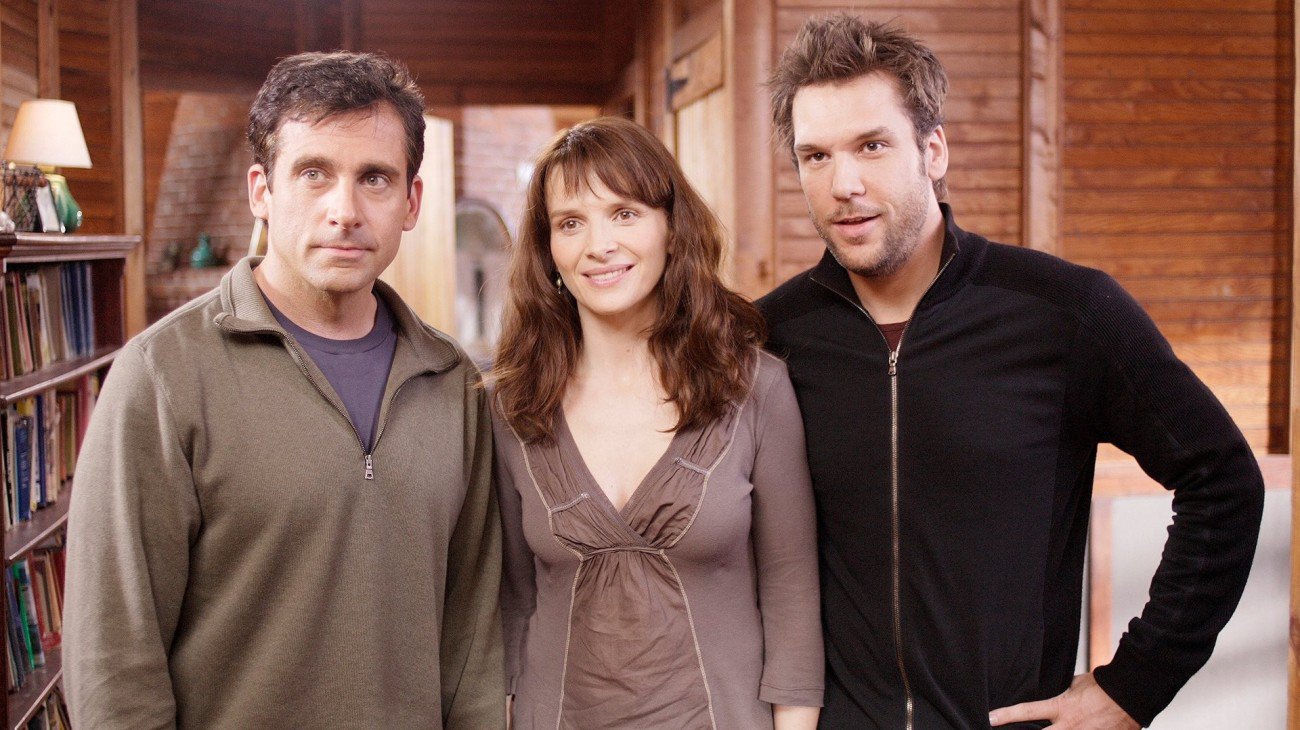
Nice and easy
Here is the plot of Dan in Real Life: Dan Burns (Steve Carell), a widowed advice columnist living in New Jersey travels one autumn to be with his parents and siblings and siblings' spouses and children, dragging along his three daughters - ages 17, 15 and 9 - all of whom have some particular reason to be angry with him. On his first day there, he heads to a used book store where he meets the infinitely charming European transplant Marie (Juliette Binoche), falls head over heels, and finds out that evening that she is dating his brother Mitch (Dane Cook). Thus is Dan launched on a three-day bender of re-evaluating his job, fatherhood, and being miserably single.
Alternately, I could say: "Voici le bande annonce," and you would see for yourself all that AND a completely unironic use of Pete Townshend's "Let My Love Open the Door." The film uses that same song, but it's even more unironic there, because it is played on acoustic guitar and sung by one of the actors who cannot exactly sing, and it is very Real and not Contrived, not One Little Bit.
Now, from my description or the trailer, you would probably think, with absolute justification, that this is a crap movie. Certainly I did, going into it. But something strange and inexplicable happened: Dan in Real Life turns out to be decently watchable, lapsing occasionally into both engaging storytelling and clever filmmaking. It is, God forgive me, charming and pleasant and sweet. Not funny. It also turns out not to be a comedy in any but the broadest possible sense, you see, and this makes it an uncomfortable fit for Carell.
But that's not really what was on my mind while I was watching. Instead, I found myself thinking that director and co-writer Peter Hedges (whose last work in those capacities was Pieces of April) had a brain in him, an actual sense of what makes for interesting visual storytelling. Most of the story takes place in and around the Burns family summer home on some lake in Rhode Island, and Hedges - aided greatly by production designer Sarah Knowles - captures something honest and tactile about an old family home. It feels lived in; it bears the weight of tens of years of family history. It is the foundation for all of the emotional heft of the story, and capturing its essence is vital for the film; and Hedges achieves this by stealing from Renoir's playbook, of all possible people - I do not blame him, for Renoir is a genius and it is well to steal from the best. In Dan in Real Life, as in the early work of that director, space is established with a constantly moving camera that frequently detaches itself from character POV and pokes around through rooms, observing everything in close detail. It is not a movie about a place, but it is a movie that could only occur in one place, and the filmmakers do a fine job of establishing that.
As for the story...I mean, it's a pack of clichés. There is no way around that. But at least the clichés are predominately well-executed and there isn't too much dialogue that rings false, until the last third of the movie. A lot of this has to do with Hedges and his co-writer Pierce Gardner (whose only prior writing credit was Lost Souls, the horror film that served as Janusz Kaminski's directorial debut. None of this has anything to do with Dan in Real Life, but it's too delightful a chain of trivia to ignore), and their general avoidance of big moments; and a lot of it has to do with the very solid cast. It's a pretty significant ensemble (John Mahoney and Dianne Wiest are the best and best-known actors here, but not the only standouts in a very crowded cast), and mostly without a false note - even Dane Cook doesn't come off as insufferably smug, or at least not more than his character sort of requires.
More importantly, in one of the biggest surprises of any movie I've seen all year, Carell and Binoche actually have something close to chemistry. They're not Hepburn and Tracy, or Bogart and Bacall, certainly, but given the chasm lying between their actorly personae, one would have expected some sort of terrible black hole of anti-romance to spring from between them. Instead, particularly in the early "meet cute" phase of things, it's honestly not that hard to believe that Dan falls a bit in love with her, more every time he sees her.
There's not one moment of the film that's earth-shattering in its unique insight, but that's only a small liability. It is clear that the goal was for laid-back amiability, something sweet and not challenging. The problem is that the film is not just laid-back, it's nearly catatonic. Woody Allen had a line in Annie Hall to the effect of "If I get too mellow, I ripen and rot," which is a perfect description of Dan in Real Life. There is a point where easygoing low energy turns into no energy at all, and much of the film sits there, being cool and breezy and willfully undramatic, and the nicely naturalistic line-readings, full of mumbles and "ums" don't help a damn thing - listening to the characters talk is lulling. Not in the third act: the third act is fast and busy, but also the least-believable part of the story, both in reference to the real world and to itself. I don't know how else the story could have ended without be a complete downer, but it doesn't feel of a piece with the rest of the film.
Still. In the heart of prestige season, there's something to be said about a restful film to let your brain unwind a bit. Not, perhaps, very much to be said, especially when "restful" comes across as a synonym for "somnambulant." But it's in no way an objectionable film, just a little sleepy and a little contrived. But it has practically no ambition to be anything else. To complain would be churlish.
6/10
Alternately, I could say: "Voici le bande annonce," and you would see for yourself all that AND a completely unironic use of Pete Townshend's "Let My Love Open the Door." The film uses that same song, but it's even more unironic there, because it is played on acoustic guitar and sung by one of the actors who cannot exactly sing, and it is very Real and not Contrived, not One Little Bit.
Now, from my description or the trailer, you would probably think, with absolute justification, that this is a crap movie. Certainly I did, going into it. But something strange and inexplicable happened: Dan in Real Life turns out to be decently watchable, lapsing occasionally into both engaging storytelling and clever filmmaking. It is, God forgive me, charming and pleasant and sweet. Not funny. It also turns out not to be a comedy in any but the broadest possible sense, you see, and this makes it an uncomfortable fit for Carell.
But that's not really what was on my mind while I was watching. Instead, I found myself thinking that director and co-writer Peter Hedges (whose last work in those capacities was Pieces of April) had a brain in him, an actual sense of what makes for interesting visual storytelling. Most of the story takes place in and around the Burns family summer home on some lake in Rhode Island, and Hedges - aided greatly by production designer Sarah Knowles - captures something honest and tactile about an old family home. It feels lived in; it bears the weight of tens of years of family history. It is the foundation for all of the emotional heft of the story, and capturing its essence is vital for the film; and Hedges achieves this by stealing from Renoir's playbook, of all possible people - I do not blame him, for Renoir is a genius and it is well to steal from the best. In Dan in Real Life, as in the early work of that director, space is established with a constantly moving camera that frequently detaches itself from character POV and pokes around through rooms, observing everything in close detail. It is not a movie about a place, but it is a movie that could only occur in one place, and the filmmakers do a fine job of establishing that.
As for the story...I mean, it's a pack of clichés. There is no way around that. But at least the clichés are predominately well-executed and there isn't too much dialogue that rings false, until the last third of the movie. A lot of this has to do with Hedges and his co-writer Pierce Gardner (whose only prior writing credit was Lost Souls, the horror film that served as Janusz Kaminski's directorial debut. None of this has anything to do with Dan in Real Life, but it's too delightful a chain of trivia to ignore), and their general avoidance of big moments; and a lot of it has to do with the very solid cast. It's a pretty significant ensemble (John Mahoney and Dianne Wiest are the best and best-known actors here, but not the only standouts in a very crowded cast), and mostly without a false note - even Dane Cook doesn't come off as insufferably smug, or at least not more than his character sort of requires.
More importantly, in one of the biggest surprises of any movie I've seen all year, Carell and Binoche actually have something close to chemistry. They're not Hepburn and Tracy, or Bogart and Bacall, certainly, but given the chasm lying between their actorly personae, one would have expected some sort of terrible black hole of anti-romance to spring from between them. Instead, particularly in the early "meet cute" phase of things, it's honestly not that hard to believe that Dan falls a bit in love with her, more every time he sees her.
There's not one moment of the film that's earth-shattering in its unique insight, but that's only a small liability. It is clear that the goal was for laid-back amiability, something sweet and not challenging. The problem is that the film is not just laid-back, it's nearly catatonic. Woody Allen had a line in Annie Hall to the effect of "If I get too mellow, I ripen and rot," which is a perfect description of Dan in Real Life. There is a point where easygoing low energy turns into no energy at all, and much of the film sits there, being cool and breezy and willfully undramatic, and the nicely naturalistic line-readings, full of mumbles and "ums" don't help a damn thing - listening to the characters talk is lulling. Not in the third act: the third act is fast and busy, but also the least-believable part of the story, both in reference to the real world and to itself. I don't know how else the story could have ended without be a complete downer, but it doesn't feel of a piece with the rest of the film.
Still. In the heart of prestige season, there's something to be said about a restful film to let your brain unwind a bit. Not, perhaps, very much to be said, especially when "restful" comes across as a synonym for "somnambulant." But it's in no way an objectionable film, just a little sleepy and a little contrived. But it has practically no ambition to be anything else. To complain would be churlish.
6/10
Categories: big ol' ensemble films, domestic dramas, love stories, warm fuzzies






